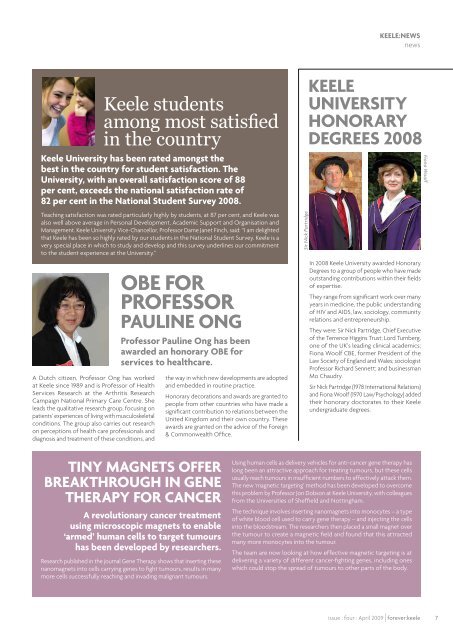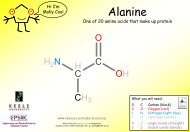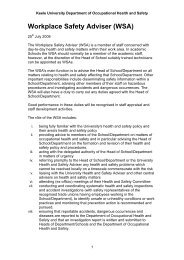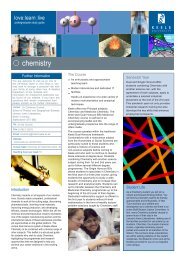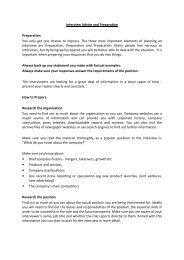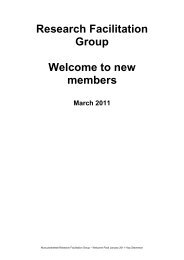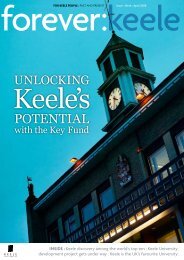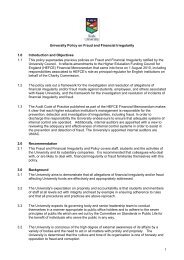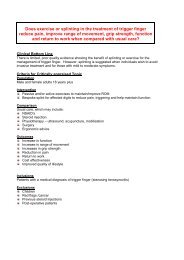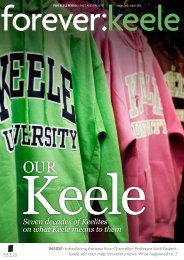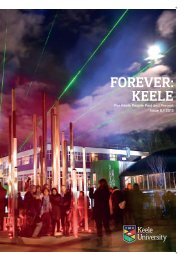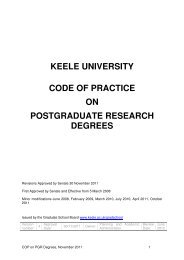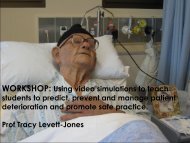Download (2.76 MB) - Keele University
Download (2.76 MB) - Keele University
Download (2.76 MB) - Keele University
You also want an ePaper? Increase the reach of your titles
YUMPU automatically turns print PDFs into web optimized ePapers that Google loves.
keele:NEWS<br />
news<br />
<strong>Keele</strong> students<br />
among most satisfied<br />
in the country<br />
<strong>Keele</strong> <strong>University</strong> has been rated amongst the<br />
best in the country for student satisfaction. The<br />
<strong>University</strong>, with an overall satisfaction score of 88<br />
per cent, exceeds the national satisfaction rate of<br />
82 per cent in the National Student Survey 2008.<br />
Teaching satisfaction was rated particularly highly by students, at 87 per cent, and <strong>Keele</strong> was<br />
also well above average in Personal Development, Academic Support and Organisation and<br />
Management. <strong>Keele</strong> <strong>University</strong> Vice-Chancellor, Professor Dame Janet Finch, said: “I am delighted<br />
that <strong>Keele</strong> has been so highly rated by our students in the National Student Survey. <strong>Keele</strong> is a<br />
very special place in which to study and develop and this survey underlines our commitment<br />
to the student experience at the <strong>University</strong>.”<br />
A Dutch citizen, Professor Ong has worked<br />
at <strong>Keele</strong> since 1989 and is Professor of Health<br />
Services Research at the Arthritis Research<br />
Campaign National Primary Care Centre. She<br />
leads the qualitative research group, focusing on<br />
patients’ experiences of living with musculoskeletal<br />
conditions. The group also carries out research<br />
on perceptions of health care professionals and<br />
diagnosis and treatment of these conditions, and<br />
OBE for<br />
Professor<br />
Pauline Ong<br />
Professor Pauline Ong has been<br />
awarded an honorary OBE for<br />
services to healthcare.<br />
the way in which new developments are adopted<br />
and embedded in routine practice.<br />
Honorary decorations and awards are granted to<br />
people from other countries who have made a<br />
significant contribution to relations between the<br />
United Kingdom and their own country. These<br />
awards are granted on the advice of the Foreign<br />
& Commonwealth Office.<br />
Sir Nick Partridge<br />
<strong>Keele</strong><br />
<strong>University</strong><br />
Honorary<br />
Degrees 2008<br />
In 2008 <strong>Keele</strong> <strong>University</strong> awarded Honorary<br />
Degrees to a group of people who have made<br />
outstanding contributions within their fields<br />
of expertise.<br />
They range from significant work over many<br />
years in medicine, the public understanding<br />
of HIV and AIDS, law, sociology, community<br />
relations and entrepreneurship.<br />
They were: Sir Nick Partridge, Chief Executive<br />
of the Terrence Higgins Trust; Lord Turnberg,<br />
one of the UK’s leading clinical academics;<br />
Fiona Woolf CBE, former President of the<br />
Law Society of England and Wales; sociologist<br />
Professor Richard Sennett; and businessman<br />
Mo Chaudry.<br />
Sir Nick Partridge (1978 International Relations)<br />
and Fiona Woolf (1970 Law/Psychology) added<br />
their honorary doctorates to their <strong>Keele</strong><br />
undergraduate degrees.<br />
Fiona Woolf<br />
Tiny magnets offer<br />
breakthrough in gene<br />
therapy for cancer<br />
A revolutionary cancer treatment<br />
using microscopic magnets to enable<br />
‘armed’ human cells to target tumours<br />
has been developed by researchers.<br />
Research published in the journal Gene Therapy shows that inserting these<br />
nanomagnets into cells carrying genes to fight tumours, results in many<br />
more cells successfully reaching and invading malignant tumours.<br />
Using human cells as delivery vehicles for anti-cancer gene therapy has<br />
long been an attractive approach for treating tumours, but these cells<br />
usually reach tumours in insufficient numbers to effectively attack them.<br />
The new ‘magnetic targeting’ method has been developed to overcome<br />
this problem by Professor Jon Dobson at <strong>Keele</strong> <strong>University</strong>, with colleagues<br />
from the Universities of Sheffield and Nottingham.<br />
The technique involves inserting nanomagnets into monocytes – a type<br />
of white blood cell used to carry gene therapy – and injecting the cells<br />
into the bloodstream. The researchers then placed a small magnet over<br />
the tumour to create a magnetic field and found that this attracted<br />
many more monocytes into the tumour.<br />
The team are now looking at how effective magnetic targeting is at<br />
delivering a variety of different cancer-fighting genes, including ones<br />
which could stop the spread of tumours to other parts of the body.<br />
issue : four : April 2009 | forever:keele 7


